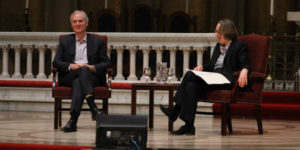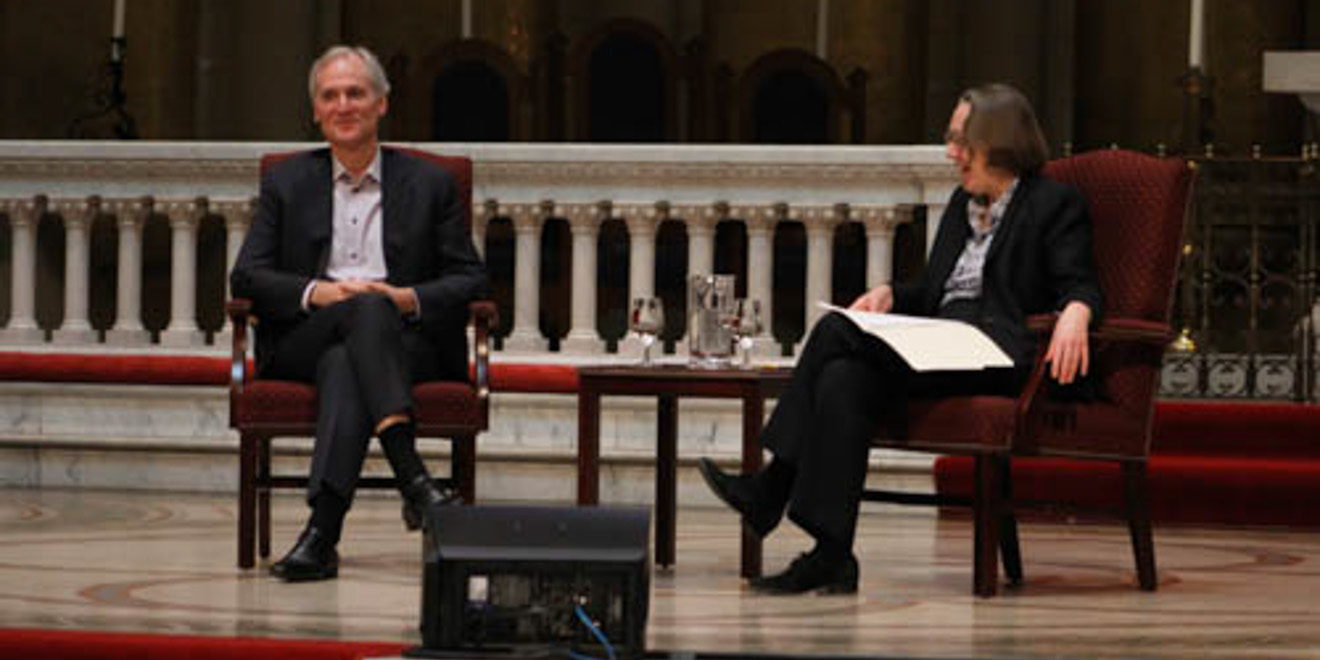Stanford President Marc Tessier-Lavigne spoke on the pursuit of knowledge, family and work as service in his “What Matters to Me and Why” address on Wednesday afternoon in Memorial Church.

Tessier-Lavigne emphasized purpose in his journey through seemingly disparate spheres: He spoke of his love for physics and philosophy, Oxford and Stanford, of the magnitude of leading institutions and the minutia of molecules that bridge the brain stem and the spine.
“Just as important as what matters is what we do with what matters,” he said.
Born in Trenton, Ontario to a military family and raised in Europe, Tessier-Lavigne studied physics at McGill University and physiology and philosophy at Oxford University by means of a Rhodes Scholarship.
“Physiology gave me my vocation as a neuroscientist, and philosophy opened my mind and taught me how to think,” he said. “Studying philosophy at Oxford was probably the single-most important part of my education.”
After completing a postdoctoral fellowship at Columbia University, Tessier-Lavigne resolved to continue his career in the United States. He said that his initial impressions of the United States – especially the country’s regard for the sciences – still hold for him today.
“Compared to so many other places in the world, I think there’s a bedrock optimism in this society, and individual drive and accountability,” he said. “We have to kindle that optimism, because there’s lots to be optimistic about if we work together to tackle problems. It’s optimism that has to keep us going. Is it a little bit dimmed? Perhaps. But [in terms of the] big picture, these bedrock values are still very alive and well in this country. It’s up to us to nurture them.”
When it came to realizing his personal values, Tessier-Lavigne said his path was not always clear to him. He recalled debating whether to study science or a more service-oriented discipline in college and deciding that he would have to find a way to connect the two.
Funded by the Paralyzed Veterans of America Spinal Cord Research Foundation early in his career, Tessier-Lavigne discovered this synthesis of science and public service as he pursued research in neuroscience and paralysis, which could directly affect the lives of individuals.
“I was really glad to hear some of the values articulated [in Tessier-Lavigne’s talk],” said Carol Muller, director of the Faculty Women’s Forum and executive director of Stanford WISE Ventures, which promotes gender equality in science and engineering. “It also made me think a lot about some of my own experiences and parallels. I also grew up as a daughter of someone in the military; I moved a lot, and I think that brings a lot of different perspectives on culture, diversity and educational values.”
According to the Office for Religious Life, which has sponsored “What Matters to Me and Why” since its inception in 1994, the series “[encourages] reflection within the Stanford community on matters of personal values, beliefs and motivations in order to better understand the lives and inspirations of those who shape the University.”
Other speakers in the 2016-17 “What Matters to Me and Why” series include Lloyd Minor, dean of the Stanford University School of Medicine, and Nicole Taylor, associate vice provost and dean of community engagement and diversity.
Professors Mehran Sahami and Alexander Nemerov will deliver “What Matters to Me and Why” addresses in spring quarter.
Contact Courtney Capen Douglas at ccd4 ‘at’ stanford.edu.
